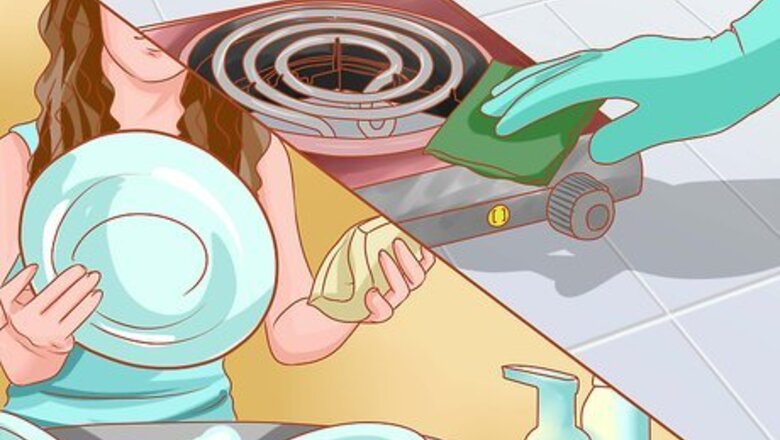
views
Tidying the House
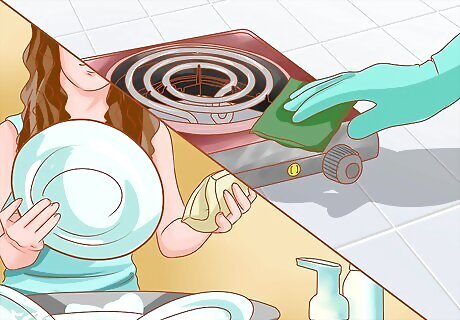
Clean the kitchen. Good housekeeping is a must when it comes to being neat and tidy, and the kitchen is one of the places that should be kept clean to keep out bugs and maintain a clean food prep area. Bacteria grows on counters when they are not kept clean, which can make you sick if you prepare meals on them. Put things back where they belong. If you have bags of chips by the microwave, put the bag of chips in the pantry. If you have spices laying around your counters, put them up in the shelf along with the sugars and starches. Wipe off the counters and sweep the floors to clean up any crumbs. You don't want bugs crawling around. Wash the dishes. Dishes piled in the sink instantly makes the room look messy and it's also unsanitary. Take out the trash and recycling. Again, you don't want stinky smells or unsightly creatures crawling around your kitchen area. Wipe down the stove and refrigerator. Organize your fridge by putting the butter, bread, and eggs on a shelf. Place the yogurts and leftovers on the top shelf, and put the milk and juice on the middle shelf. That way, you can find things easily because it's in the proper place.
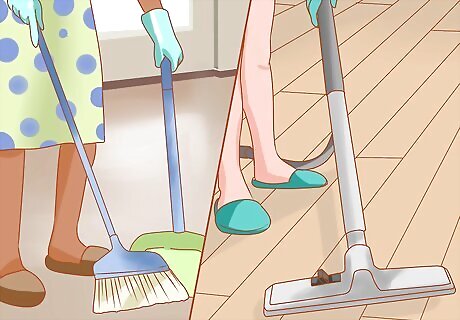
Vacuum or sweep the floors in the entire house. If you wear shoes and socks in the house, you're tracking dirt through your home. Even if you're just wearing socks, you can still track dirt attached to your socks through the house.Vacuuming and sweeping also give you a chance to move any obstructions in the halls and make you notice how many misplaced items are on the floor. Vacuum or sweep room by room. Pick up any items on the floor and place them in a basket or container. Once you're done, walk around each room of the house with the basket and put the items back where they belong. For instance, any cups or plates in the basket should go back to the kitchen. Any shoes in the basket, should be put back in the closet. EXPERT TIP Adopting a 'No shoes inside the house' policy will save you hours of housework every week. Susan Stocker Susan Stocker Green Cleaning Expert Susan Stocker runs and owns Susan’s Green Cleaning, the #1 Green Cleaning Company in Seattle. She is well known in the region for outstanding customer service protocols — winning the 2017 Better Business Torch Award for Ethics & Integrity —and her energetic support of green cleaning practices. Susan Stocker Susan StockerGreen Cleaning Expert
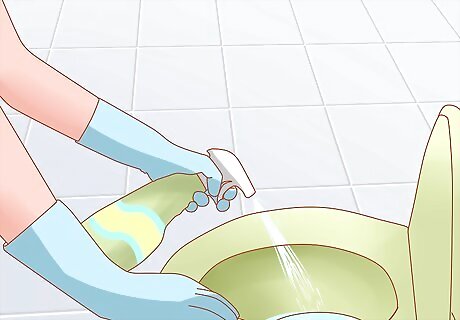
Scrub the bathrooms. Dirt, grime, mold and even bacteria can build on bathroom tile and around the toilet bowl, so it's important to clean the bathroom regularly. Spray your bathroom toilets, tile and bathtub with your favorite bathroom cleaner. Then, get a scrub brush and clean away and the dirt and grime. Wipe down the counters and place items back in the medicine cabinet or in the drawers. Attempt to group things by category as you put them away. For instance, group all the curling irons together and put them in one place. Put all of the toothpaste and toothbrushes in an area.
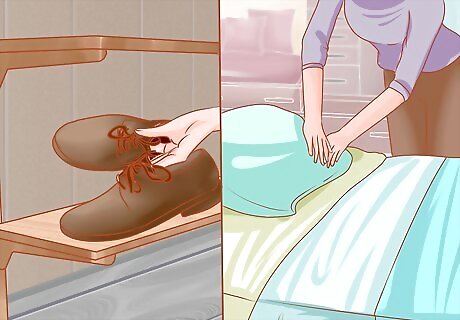
Sort and arrange the items in every room. Tidy the room by picking up items and putting them back where they belong. Pick up the misplaced items on the floor and put them back where they belong. Make the bed. Put shoes back in the closet. Pick up the pillows off the floor.
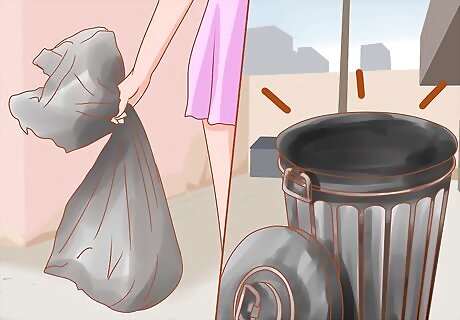
Empty all the trashcans. Don't let trash pile up around your home. It leads to bugs, bad smells, and it definitely makes a room look untidy. Go around to all the waste baskets in the house and empty them in a large waste bin. Then, take out the trash.
Decluttering Your Home
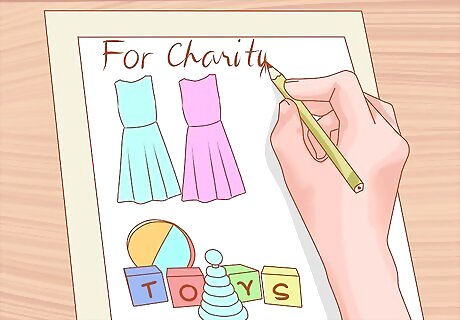
Get rid of items you don't need. Go through your belongings and set aside the items you no longer want or need, or simply put items back where they belong. For instance, put clean clothes back in their drawers or hang them up. Make sure dirty clothes end up in a hamper. Toss out broken or badly worn items. Go through your closets and remove clothes that no longer fit. Any clothes with stains, rips or tears should be put in a bag as well. Old toys, games, broken items and unwanted items should be set aside to be given away or sold. Seek obvious clutter -- clutter on the floors and counters. For instance, if you have two knife blocks, you can probably give one away to make more counter space. Once you have set aside the items you don't want, separate them into a sell pile and give away pile. You may need separate bags or boxes for each category of item. List the gently used items on Craigslist or give them away to charity, a family member or friend
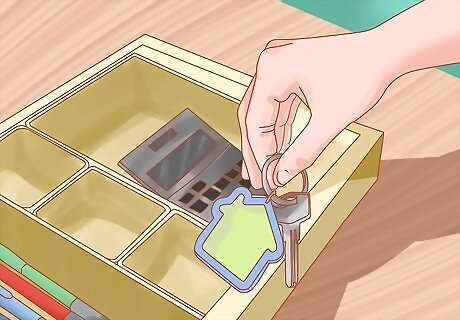
Declutter the hidden cluttered areas. Disorganized drawers and closets offer the illusion of a clean and tidy room because you can simply close the door and hide the mess. Yet, once you open the closet door, items come tumbling out, or you're unable to find anything in the messy closet. So, if you have drawers that you can barely close, then it's time to go through them and sort them. Empty out the drawers completely and toss out anything broken. Set aside items that you may need like keys, and place stray items, such as batteries, that have been rolling around in the drawer in a basket for organization later. Once you have it sorted, neatly place the items back in the drawer. Note if you need an organizer to help keep everything together neatly.
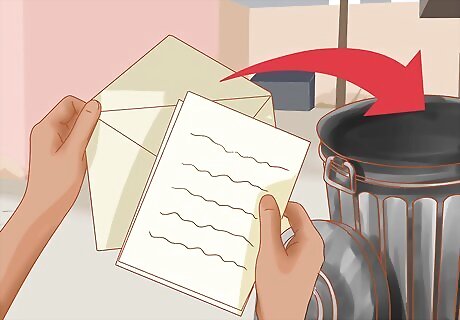
Throw away old mail. You don't need to keep every bill or piece of mail forever. Stacks of mail piled up on your counters or inside desk drawers creates a mess -- both hidden and unhidden. Go through the stacks of mail, newspapers and coupons while sorting out recent mail you need to keep from expired coupons and tattered newspapers. Toss out or recycle the old stuff. Like a pile of dishes in the sink, stacks of mail make a room look untidy and unkempt. Utility bills and paycheck stubs don't need to be kept longer than a year. ATM receipts can be tossed out after a few days. Set aside the coupons and mail that you need to keep. Throw away the rest. Once you have sorted the mail you're going to keep, neatly place the items back where they belong. Make a mental note about if a mail organizer is necessary.
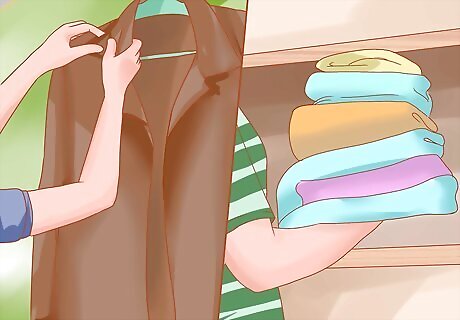
Hang up and put away clothes. Piles and piles of clothes strewn across a room make it appear messy even if everything else in the room is tidy. Set aside the clean clothes and place them in drawers or hang them up. Fold clean unfolded clothes and put them away. Put unwanted clothes in a bag to be given away or sold. Shoes strewn across the room or piled up in a corner is no less of a mess. Set shoes upright in the closet, and put any unwanted shoes in the “give away” or “ to be sold” bag.
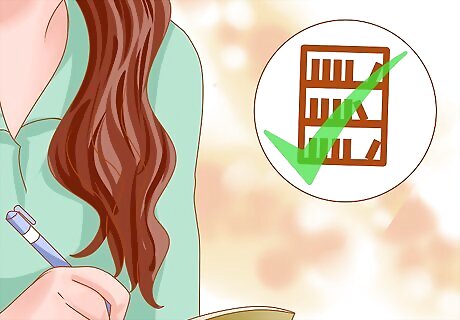
Make a list of needed organization items. As you clean, make a list of organization materials that you might need to keep everything tidy. For instance, you might need a shoe rack to keep your closet neat. Do you need more hangers? What about a desk organizer? Do you need another bookshelf? Baskets with lids are great for storage and hiding clutter. You can store items inside of them without having to look at everything you own. If you don't have a lot of floor space, then make use of your wall space. You can put up more shelves or bookcases, and this will help to free up some space to help keep everything organized.
Getting Rid of the Clutter
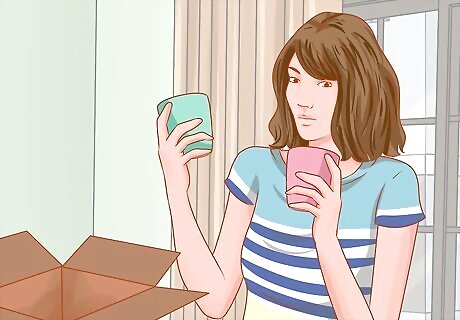
Decide what you're keeping. Go through everything that you've pulled out of your closets and drawers and sort them into four piles: keep, give away, sell and trash. Assess the items by asking yourself a few questions: Have you used it in the past year? Would you buy the item again? Am I only keeping it because I don't want to waste money? Am I keeping it for sentimental value? Items that should not be kept are broken items and outdated items that have been collecting dust. If you haven't used the item in many many years, it is time to dispose of it unless it is for sentimental value. Keep the items you use frequently. Get rid of stained, torn and dusty unused items. Don't keep items simply because you think you might use it again even though you haven't used it in years. (Don't be a hoarder.) Unused sentimental items can be stored away for safe keeping. Old t-shirts, pictures, books and stuffed animals that are purely for sentimental value can be stored away in a large storage chest. Separate them from your frequently used items so that they don't take up space.
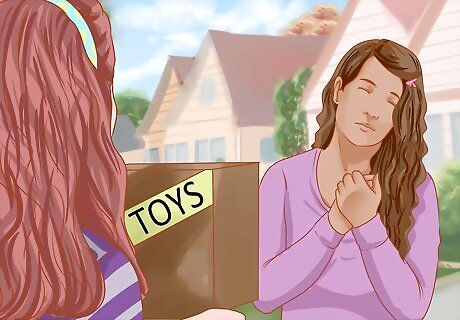
Give away unwanted items. These would be the items that didn't pass the test when you asked yourself the “decluttering questions, “ and you're unable to sell them for some reason. Examples of unsellable items might be outdated items, items with blemishes or heavily used items. Once you've separated the wanted items from the “giveaways,” place them in a pile away from the keep and trash pile. Give them to friends, family or charities such as the Goodwill.
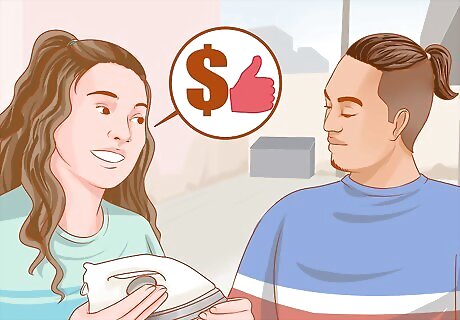
Sell the items on Craigslist or Ebay. Electronics, furniture and appliances that you simply do not need or want can be sold online. Simply take a picture of the item, and create a short listing on the website. You can make some extra money on the side selling your unwanted decluttered items, but the website you're using matters. Some websites are better than others for selling your goods. Craigslist is best for selling furniture, appliances and electronics to local buyers in your area. Sell old cell phones, laptops or unused supplies to an international crowd on Ebay, which allows people to bid on items or purchase them outright.
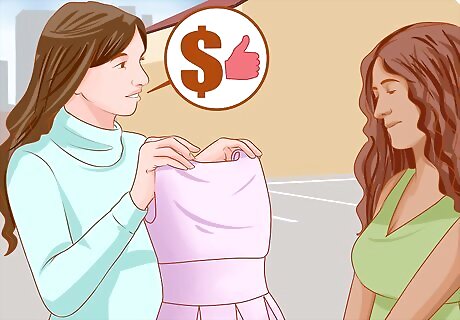
Sell used clothing and shoes. Gently used clothing can be re-sold if they are trendy, designer or too nice to give away. Stores such as Plato's Closet or Buffalo Exchange purchase gently used clothing without stains or holes that they believe can be re-sold to its customers. Keep in mind that whether or not the store takes the items is up to the discretion of each individual store. Local consignment shops and local chains in your area similar to Plato's Closet also are great resources for selling used clothing. Review the store's website to assess if your clothing fits the store's re-sale criteria.
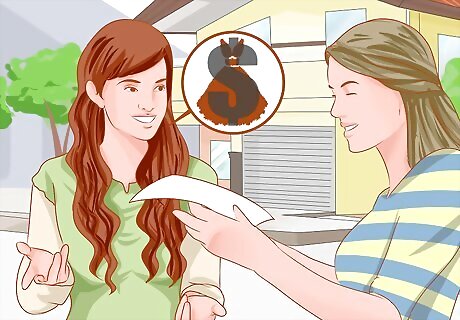
Have a garage sale. If you have a number of items to get rid of, then it may be faster to have a garage sale over a weekend. Advertise by putting signs around your neighborhood. Then, label your items and get ready to haggle. Use the money you make to purchase new organizing materials for your home.
Finding A Home For Everything
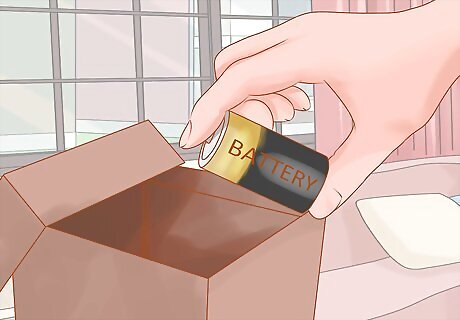
Assign a home for everything even the items that have no home. Some items are easy to find a home for such as the kitchen scissors. They belong in the knife block on the kitchen counter, but where should you store the batteries you found rolling around in a drawer? Mentally decide where everything should go so that every item has a home. Put any random items in a location you think is appropriate. For instance, put screws in a tool box. Put pens and pencils in a container on the desk. Put decorative items on a side table.
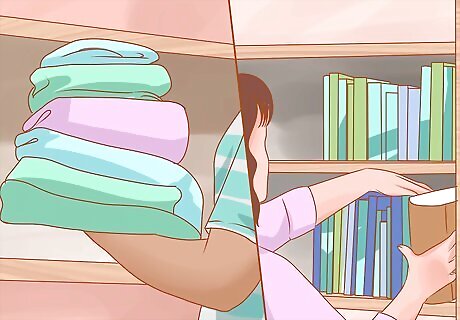
Re-organize badly organized items. If your current bookshelves, closets, or drawers aren't laid out well, then re-organize them. You don't always have to toss out items to declutter. Sometimes you need to re-organize books, closets, shelves and the items they hold because entropy has taken over, and sometimes it's because the items were never organized well in the first place. Restack the books on the shelves. Unfold and refold items in the linen closet that make it look messy. Take all the shoes out of the closet and then line them up in the closet again. Assess what you may need to store everything properly. Consider boxes, baskets, shelves and underbed boxes. Utilize your wall space to create more living space in your home. Think about hanging more items on the wall or putting up shelves if you don't have a lot of floor space.
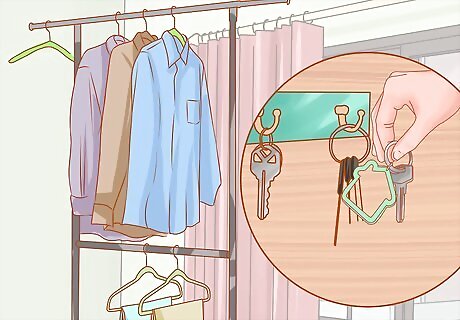
Purchase items to store away things. Stores such as The Container Store, Target and KMart have lots of organization materials to choose from. Don't be afraid to get creative, and consider a wide variety of materials. Cardboard office style shoe boxes are good for storing items on open shelves. Baskets, which usually don't have lids, are good for storing items you don't mind displaying like magazines or extra throw blankets. For closet organizers, look for hanging shoe racks and clothes racks. Grab some extra- hangers and hooks if you need them. Underbed boxes are good for overflow -- stuff that doesn't have any other place to go. Use them to store seasonal clothes like sweaters. Ottomans with interior storage areas can help you hide clutter. Also, think about bookshelves, boxes with lids and baskets to organize items like magazines that otherwise might be left laying around on the floor. If you have any messy drawers or cabinets, think about purchasing some drawer organizers. These are good options to store loose items like tacks, coins and batteries. Hooks and small dishes are good decorative options to store keys and loose items. Zip ties and charging stations can help you make your area look neater by making your charging cords more organized.
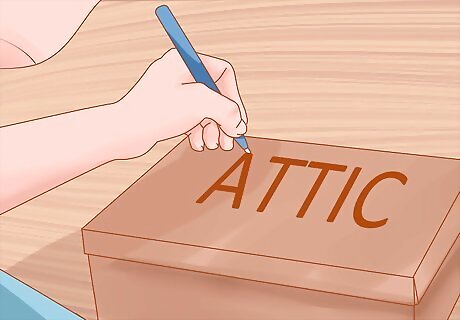
Store away what you're keeping. Once you have everything that you need, put everything away neatly in its new organizers. Use clear storage containers so that you can see what's inside. You'll thank yourself later when you're searching for your items, since you won't need to open every single box to see what it contains. Place items that you'll rarely use in storage spaces such as the attic or basement. Put more frequently used items under the bed or in the closet. Label the boxes that are going to be stored away in closets or under the bed so that you don't have to open the boxes when you're searching for your items.
Maintaining a Clean and Tidy Home
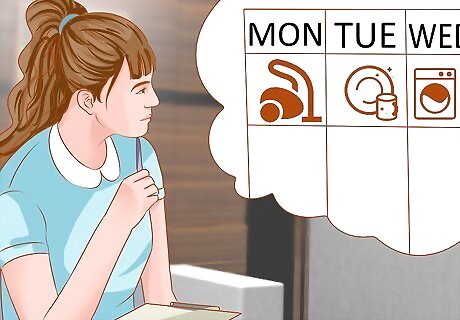
Set a cleaning routine. Left to your own devices your home might be messy again in no time. So, set a cleaning schedule to help keep you on track. The schedule will also help you create a new habit of cleaning and tidying more frequently. Choose days for vacuuming, cleaning the bathroom and taking out the trash. Make a mental note of how many dishes you should allow to pile up in the sink before you wash them. Or, don't let them pile up at all. Wash them after every meal.
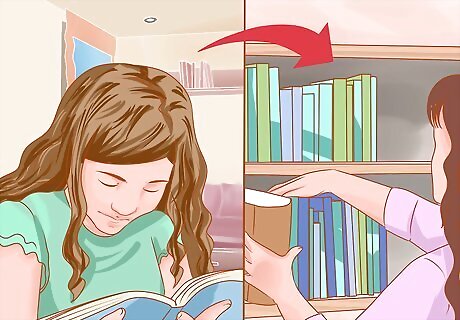
Put everything back where it belongs. Since you've taken the time to find everything a home, establish a routine of putting items back where they belong. Making a habit of putting items back when you're done with them means you'll be less likely to allow items to pile up. Your home will stay cleaner longer. If you live with people and you have moved some items around, make sure you tell them where everything belongs, so they can put them back too.
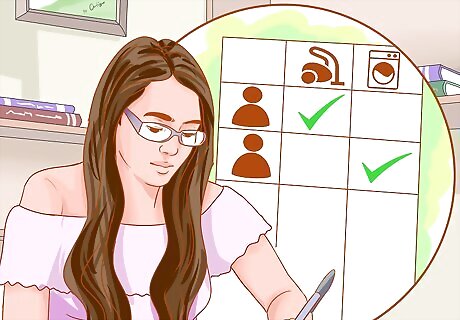
Assign chores. If you live with other people, give everyone weekly or nightly chores. When maintaining the house is everyone's responsibility, the house is easier to keep clean and tidy. More people cleaning consistently equates to a cleaner home. There's power in numbers. Task someone with doing the dishes every night or take turns. Decide who is going to vacuum each week and clean the bathrooms. If you live alone, then you get the lucky task of doing everything alone.
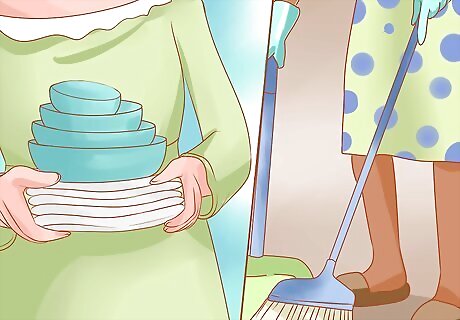
Tidy up every night. Before you go to bed, do a quick clean-up. Put dirty dishes in the sink. Pick up anything laying on the floor. Make it look nice enough so that when you wake up in the morning, the look of your home is a benefit, not a stressor.
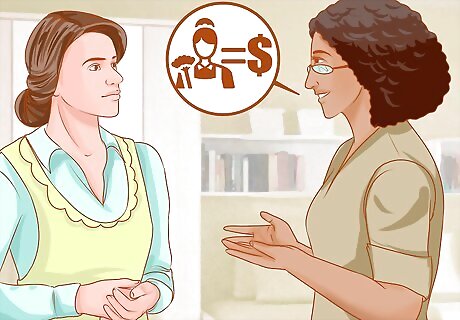
Hire a cleaning service. If you're really busy, hire a maid to come weekly or monthly to help you out. With busy schedules, everyone doesn't have the time to clean all the time, and there's nothing wrong with employing help. Simply do your research to ensure you find the right person to clean your home.Warning: It's important to remember that a cleaning service is not free and will cost you money.
















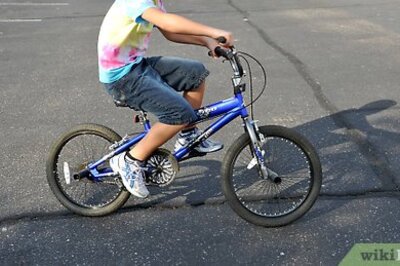
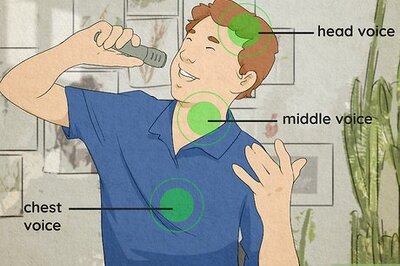

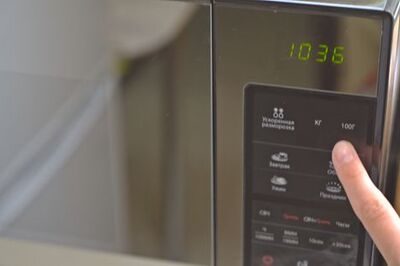
Comments
0 comment